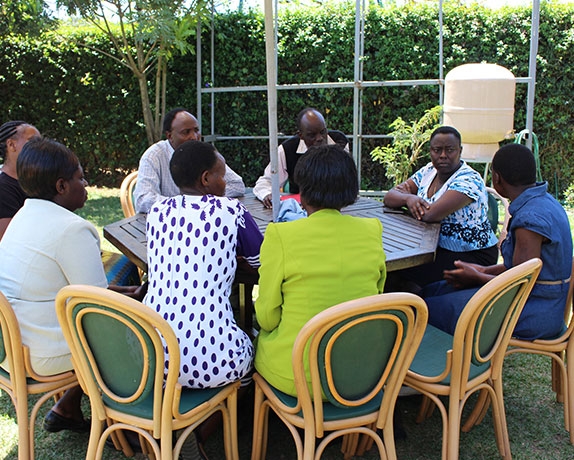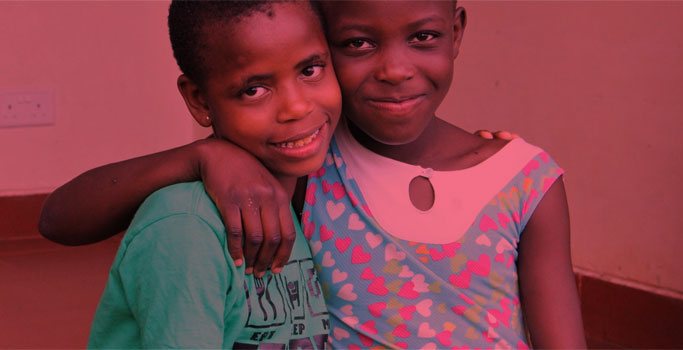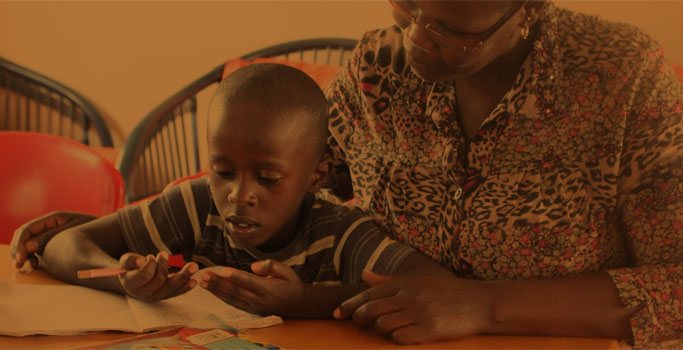

JOHN GARANG HUMANITARIAN GROUP FOUNDATION KENYA programmes include, the SOS family care model with over 45 years’ experience in offering long term alternative care based on its family like model. Under this programme SOS CV Kenya innovates and improves its work with SOS families, using unmatched experience and competence to explore relevant care solutions and define the best alternative care option for each child. The Family Strengthening programme is a family child care model that prevents vulnerable children from losing the care of their biological families by addressing situations that enhance their vulnerability to enable children stay and live with their families. This ensures that children who fit in this category not only remain in their families, but survive and thrive within their families of origin, learning their culture and retaining their identity and sense of belonging. The Education and Health programmes facilitate access to quality education and health for orphaned and vulnerable children while the Youth empowerment programme prepares youth for employability and social inclusion in the wider community. Finally, Advocacy interventions aim at taking action to improve laws, policies and practices that undermine the wellbeing of children at risk of losing parental care or those who have already lost it. This ensures children fully enjoy their rights in a supportive environment.
The Community Action for Quality Care (CAQAC) programme is an advocacy initiative that builds on the long experience, capacity and legitimacy of JOHN GARANG HUMANITARIAN GROUP FOUNDATION in Kenya on quality alternative care. Funded by CISU – Denmark, the programme has been implemented in Eldoret, Kibulgeny area since 2017. Kenya was one of the first African countries where we became active. The national Kenyan association was founded in 1971, primarily because of the ever-increasing number of orphaned and neglected children in the country. We have been running SOS Family Strengthening Programmes in the country to enable children who are at risk of losing parental care to grow up within a caring family environment. To achieve this, the organization works with targeted families and communities, empowering them to effectively protect and care for their children. At present, the organization supports children and young people in Kenya by providing day-care, education, vocational training and health services in five different locations. Children whose families cannot take care of them can find a loving home in one of the SOS families.
The family unit is the main source of provision for all the basic needs to children including food, shelter, health care, education clothing and protection. It is the single most important influence in a child's life. From their first moments of life, children depend on parents and other family members to protect them and provide for their needs. When families disintegrate and the social fiber weakens, the nation in turn becomes weak. As a result of gradual family disintegration in Kenya, many children in the country are separated from their families or placed in institutional care, or extended families. Often families are separated and children placed in institutional care due to poverty, family breakdown, medical and health crises, abuse or lack of sufficient supportive services. The advocacy programme highlights key issues and proposes policy recommendations for advocacy interventions.
Through the CAQAC programme, SOS CV Kenya supports families and strengthens community child care structures in Eldoret’s Kibulgeny location by assessing the gaps that exist within foster and kinship care systems, which are considered as alternative care options or models. The programme pilots, tests and monitors the implementation of alternative care options while documenting changes and lessons learnt for best practice, learning, advocacy and possible replication in future. This was informed by key findings of social learning research carried out on Evaluating Kinship and Foster Care Arrangements: A Case Study of Families in community action for alternative care project. Findings of the social learning research which were carried out in 2018 revealed that most of respondents were unable to identify the types of foster care in the community from other alternative care arrangements. Most of the children who were being taken care of outside their biological families had economic, medical, legal, psychological needs. Furthermore, those taking care of children under their custody had inadequate caregiving skills for responsive care, discipline and child safety. As far as legal challenges are concerned, most children under foster care lacked birth certificates, hence limiting them from many legal aspects of child care such as access to free health care for children under 5 years, free primary education and the right to identity. Other challenges include the need for trauma support and resolution of family conflicts.
Our Alternative Care programming is embedded in the rights based approach and internationally recognized standards. In its Guidelines for Initial Reports and Periodic Reports, the UN Committee on the Rights of the Child has grouped the provisions of the United Nations Convention on the Rights of the Child (UNCRC) in clusters. Cluster five is dedicated to the rights of children who are in danger of or who have already lost parental care. The UN Guidelines for the Alternative Care of Children state that the family is the best place for children to grow up. Alternative care must be implemented only after all possible efforts to retain children in their families of origin have been exhausted, and as soon as possible children shall be reunited with their families. If there is a need for care outside the family, the guidelines recommend alternative care options in a family environment such as kinship or foster care. To achieve its objective, and its partners build community awareness on alternative care and mobilize local and strategic partners to engage in budget tracking for alternative care. The aim is to create more public demand for accountability from primary duty bearers and recognition that duty bearers must assume responsibility towards children who have lost parental care or those at risk of losing the same. In order to contribute strategically and strengthen Alternative Care systems in country programmes, employs the following mutually reinforcing components: capacity building of professionals, Strategic service provision and Advocacy. These interventions are further enhanced by putting institutions to account through the use of the Community Score Card (CSC) approach. The CSC approach has been used to facilitate good governance through promotion of participation, transparency, accountability and informed decision-making. The approach brings together community members, service providers, and local government representatives to identify challenges in service provision and utilization, to mutually generate solutions, and work in partnership to implement and track the effectiveness of those solutions in an ongoing process of quality improvement.
The main goal of the Community Score Card has been to positively influence the quality, efficiency and accountability with which child care services are provided at different levels. The core implementation strategy in achieving the goal has been the use of dialogue in a participatory forum that engages both service users and service providers (Para social workers, Programme staff, Location and National officers, County coordinator, Area advisory council, Caregivers, County and National government and Partners). JOHN GARANG HUMANITARIAN GROUP FOUNDATION Kenya assessed the gaps in the alternative care framework, and piloted alternative care options hence supporting in filling the gaps by testing quality alternative care services with a sample of children in alternative community care in Kibulgeny location; monitoring and systematically documenting the applied methodologies and tangible results of the strategic models and services; and developed best practices for potential replication by the community care frameworks and as evidence for advocacy.
In summary, Protection policy interventions have been focused on the following four key actions namely Awareness – developing an open and responsive culture and an understanding of child abuse and the adverse effects of child abuse; Prevention – creating a safe environment in the organization’s processes and practices as well as a selective recruitment, training and child participation; Reporting – establishing accessible channels for reporting, taking all concerns seriously and protecting those who report; and Responding – demonstrating clear leadership and timely response to child abuse within and in our spheres of influence.
LEGAL FRAMEWORK AND DUTY BEARERS INVOLVED IN ALTERNATIVE CHILD CARE IN KENYA
In Kenya, Alternative Child Care is guided by the Children’s Act (2001), which outlines the roles and responsibilities of government authorities in the care and protection of vulnerable children. The National Council for Children Services (NCCS) exercises general supervision and control over the planning, financing and co-ordination of child rights and welfare activities and advises the Government on these issues. The Department of Children’s Services (DCS) is mandated with the core responsibility of implementation of child welfare programs. Specifically, under the direction of the Director, the Department safeguards the welfare of children. It assists in the establishment, promotion, co-ordination and supervision of services and facilities designed to advance the wellbeing of children and their families. Besides Government institutions, other stakeholders in the field of Alternative Child Care include National and International Non-Governmental Organizations (NGOs) and the Private sector. Children and the community are considered key stakeholders in the field of Alternative child care in Kenya and therefore, works in close partnership with them both at the National and county levels.

As an SOS child sponsor, you can make a lasting
difference in the life of a child at risk.

Help us to continue to provide emergency care,
food, shelter, protection, child friendly spaces,
health care, education and other essentials for
children and young people at risk.
Get the latest news on how we are making a difference
in the lives of children and families worldwide.